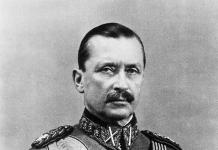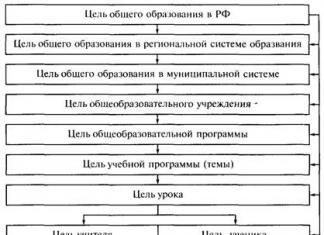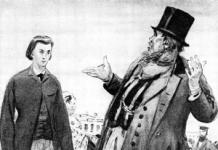a structurally organized level of being in the world, which has its own specific mode of existence, its own form of manifestation and its own form of implementation [Kalnoy I.I. Philosophy: Tutorial. - Simferopol: Business-Inform, 2002. - S. 328].
Great Definition
Incomplete definition ↓
SOCIETY
it is the interconnection and interdependence of a certain mass of people, based on the mutual satisfaction of interests, jointly leading their economy, practicing the way of life adopted by them; it is a set of historically established forms of joint activity of people; historically candy type of socio-economic system.
People are united in society not by ideas, but primarily by material interests, due to their biological and social nature, the division of labor and the mutual dependence developing on this basis. Theories of the "contractual" origin of society are untenable: a person is originally a public, social being. No matter how high one or another individual puts himself, his birth, existence and development as a person is impossible outside of society. The young Marx, translating Hegel's views on civil society in his own way, wrote that "the selfish individual civil society in its insensible conception and lifeless abstraction, it imagines itself to be an atom, i.e. not standing in relation to anything, self-sufficient, devoid of needs, absolutely complete, blissful being. The impious sensual reality does not care about his imagination. Each of his senses makes him believe in the existence of the world and other individuals outside of it, and even his sinful stomach daily reminds him that the world outside of him is not empty, but, on the contrary, is what, in fact, fills him. Each active manifestation of his being, each of his properties, each of his vital aspirations becomes a need, a need that makes his self-love a love for other things and other people outside him. And since the need of one individual does not have any self-evident meaning for another egoistic individual who has the means to satisfy this need, i.e. is not in any direct connection with the satisfaction of the need, then each individual must create this connection, becoming in turn a pimp between someone else's need and the objects of this need. Thus, natural necessity, the properties of a human being, no matter how alienated they may appear, interest - this is what links the members of civil society to each other. (Soch., vol. 2, p. 134).
Man, being both a biological and social being, contrary to the existing simplisticists, cannot be reduced to "the totality of social relations, therefore, both the biological and social nature of man always manifest themselves in his individual development and the progress of the whole society. But here it is important to keep in mind next: man is the only creature, the satisfaction of whose needs leads to the emergence of new needs that require their satisfaction. In this constant expansion of human needs is the root cause social progress, the engine of progressive development of society. Labor created man and human society, because, having mediated the exchange of substances between man and nature (and without such an exchange, the very existence of man (society) is impossible, as well as the existence of any living being), labor, production singled out man from nature and formed the material basis a qualitatively new, already social and human, and not just a collective animal slurry. On the basis of connection with labor activity, language, speech, consciousness arose, which not only consolidated, but also strengthened the social, social nature of both the person himself and the way of life of human communities.
If initially nature was for the emerging man both the pantry of the means of labor, and the main source of livelihood, and changes in the natural, geographical environment had a decisive impact on the change in metabolism and the person himself, then with the advent of labor, production, the dependence of a person on the surrounding living conditions changes qualitatively. : it is no longer nature alone, but along with it, to an ever greater extent, labor, production, mediating the exchange of substances with nature, have an ever-increasing impact on the natural and social evolution of man, on the progress of human society.
The absolutization of this indisputable fact led the communists to the conclusion that the only and constant criterion of social progress is the development and multiplication of material means of labor, and its indicator - the change of socio-economic formations (primitive communal system, slavery, feudalism, capitalism and communism) - is main, if not the only indicator of social progress. Such an approach greatly simplifies the problem of the progress of society, the stages of its development. And when it is dogmatized, which took place in life, it simply makes it impossible to understand history in fact, because with such an approach it turned out that the communists complete and "close" history: communism is the peak and end of development that knows qualitative changes.
The main methodological error here was that as a constant criterion of social progress, the means of progress were used, which could and did turn out to be not only different at different stages human history(which is not so bad), but also completely incomparable, incomparable among themselves, and this already excluded the very possibility of using such a criterion.
A different approach seems correct: as a constant criterion for the progress of human society, one should take not the means, but the results of development, and comparable, comparable with all the variability of the means used to achieve such results.
Now it can be argued that social progress or the upward development of society, having as its material basis the ever more complete satisfaction of growing human needs (this is achieved within different periods of history by qualitatively different means acting as the main source of social wealth: nature, direct labor, reason), always has as its result, on the one hand, the "humanization of man", i.e. the development of the natural and social forces of the "man" kind, the self-realization of his human potentialities, and on the other hand, the increase in the dominance of social man over the natural and social conditions of his existence, over himself. Both of these are the key criterion of social progress, the height to which society has risen, evidence of the degree of freedom achieved by mankind within the framework of natural and historical necessity.
Such an approach should make it possible to exclude one-sidedness, when the progress of society was measured by one level of development of the productive forces, material production, and at the same time, the social conditions for the development of society and human life were not taken into account. Another one-sidedness is also ruled out, when the progress of society, the superiority of one social system over another, was measured only by the quality of social relations, with complete disregard for what level of well-being, what quality of life a given system offers for its citizens.
Society. This - within the framework of any social system, the sphere of activity of the totality of various organizations, the research of which is carried out by sociologists, is much wider than the activity of "government" in the narrow sense of the word. It must be clearly understood that, even under a liberal political system, organs such as the press, economic institutions, youth organizations, professional associations, religious organizations, and all other social institutions are also part of the political system.
The author focuses on two opposite types of political system - totalitarian and "open" society. The totalitarian political system to which the author refers and former USSR, "if we consider it as a huge, complex bureaucratic organism, similar in structure and functions to giant corporations, armies, apparatus government controlled and other Western institutions. Like all gigantic organizations, wherever they may be, a totalitarian society seeks to rationally organize all human life, starting from professional activity to regulation of consumption and organization of leisure. Like the bureaucratic systems listed above, a totalitarian society has an extremely authoritarian political structure in which the ruling elite is not subject to any control by the rank and file of the organization, although most of the gigantic bureaucracies of the modern world claim that their rank and file members participate in the public life of the organization. In such systems individual people they find themselves in a position where invisible and uncontrollable authorities incessantly carry out some changes in society that are undesirable to the members of this society. All people are forced to live in a world that was not created by them and that someone is constantly trying to change.
The term "open society" is now very widely used, but the meaning given to it is incorrect or inaccurate. Yet we can point out some of the main features that those who use the term have in mind. For example, one should name the lack of uniformity in such a society and the presence of contradictions. When speaking of an "open society", everyone believes that it is characterized by a pluralistic structure and conflicting interests of individuals and groups that make it up. Therefore, in an "open society" there must be constant clash of interests, even though in a well-functioning society there are appropriate ways to manage conflicts, reach compromises and maintain commonality. Since, however, the lack of uniformity and the existence of conflicts can undoubtedly be found in any society, one who speaks of "open societies" is forced to add that pluralism must be free and spontaneous, that the struggle for individual and group interests must not be limited. no boundaries and that there should be no despotic power taking over the resolution of conflicts, imposing their decisions on rival groups. Anyone who uses the term "open society" will no doubt agree that the outcome of a conflict of interests ultimately depends on the relative power of the various groups (this power may depend on the wealth of the group, its numbers, prestige, ease of access to policy makers, its economic role in society and other factors), but the concept of "open society" suggests that, as a rule, different interests tend to balance, resulting in "open society" is in a state of ever-changing equilibrium. Therefore, conflicts are usually resolved through compromise. And finally, the idea of freedom as the most important condition for the existence of an "open society" is closely connected with the postulate of dynamic equilibrium. Upon closer examination, freedom in this sense turns out to be nothing more than the absence of a system of values that is mandatory for all (perhaps, with the exception of a unanimous decision to comply with this particular last condition). "Open society" implies the denial of any moral absolutes. It is a relativistic, individualistic and, perhaps, in some sense, immoral society. But this moral relativism, again, can be characterized in a positive sense as a commitment to freedom, individualism and anti-authoritarianism, and therefore as an expression in the highest degree humanistic moral principles, which citizens do not forget, because they always turn to these high ideas when they assert their freedom and protect it from the encroachments of despotic power.
This is not the place to speculate whether the picture of the "open society" that has been painted corresponds to any political system that actually existed in the past or exists at the present time. However, we can justifiably assert that centralized control, a uniform system of organization, and a system of values and priorities binding on all dominate a totalitarian society and distinguish it from the industrial societies of the West. True, within the broad framework of a totalitarian political system, there is some freedom, elasticity, and diversity, as in any gigantic bureaucratic system. However, the entire system as a whole is united under a single command, its activity is coordinated by one set of goals, binding on all, directed and coordinated by one central hierarchy.
The bureaucratic features in this system are immeasurably stronger than the elements of freedom. The bureaucracy in the form in which it is known to us in Western societies, in the totalitarian system, is undergoing significant changes: it becomes virtually omnipotent. In the West, bureaucracy usually exists within a larger society that limits its effective functioning in some way. In a totalitarian system, however, it permeates the entire society and, as a result, is beyond any control. No Western corporation, no organization, army or bureaucratic system has such power over literally all parties. human life, which has a totalitarian regime.
Although I deeply appreciate many of the benefits of Western constitutionalism, I still beware of showing complacency, because there is still too much evil around us. I seek to draw the reader's attention to the many manifestations of this evil, not by "rehabilitating" the Soviet system, but by pointing out the beam in our own eye. It is also useful to recall that researchers in other countries of the world may well construct a different scheme of classifications and assessments, in which the USSR and the USA will be on one end, and other political systems on the other. At the same time, I reserve the right to argue that the actual political systems that exist often become little more than caricatures of the utopia for which they were created, and that Soviet socialism discredits the idea of socialism no less than the reality of the West discredits the ideas of free enterprise and constitutional democracy.
Great Definition
Incomplete definition ↓
Founder Auguste Comte considered it about society, the space in which people live. Without it, life is impossible, which explains the importance of studying this topic.
What does the term "society" mean? How does it differ from the concepts of "country", "state", used in everyday speech, often as identical?
The country is a geographical concept denoting a part of the world, a territory that has certain boundaries.
- the political organization of society with a certain type of power (monarchy, republic, councils, etc.), bodies and structure of government (authoritarian or democratic).
- the social organization of the country, ensuring the joint life of people. This is a part of the material world isolated from nature, which is a historically developing form of connections and relations of people in the process of their life.
Many scientists have tried to explore society, to determine its nature, essence. The ancient Greek philosopher and scientist understood society as a set of individuals who united to satisfy their social instincts. Epicurus believed that the main thing in society is social justice as a result of an agreement between people not to harm each other and not to endure harm.
In Western European social science of the XVII-XVIII centuries. ideologues of the new rising strata of society ( T. Hobbes, J.-J. Rousseau), opposed to religious dogmas, was put forward social contract idea, i.e. contracts between people, each of which has sovereign rights to control its actions. This idea opposed the theological approach to the organization of society according to the will of God.
Attempts have been made to define society, based on the allocation of some primary cell of society. So, Jean Jacques Rousseau believed that the family is the most ancient of all societies. She is the likeness of a father, the people are like children, and all who are born equal and free, if they alienate their freedom, it is only for their own benefit.
Hegel tried to consider society as a complex system of relations, highlighting as the subject of consideration the so-called, that is, a society where there is a dependence of everyone on everyone.
Of great importance for the scientific understanding of society were the works of one of the founders of scientific sociology O. Konta who believed that the structure of society is determined by the forms of human thinking ( theological, metaphysical and positive). He considered society itself as a system of elements that are the family, classes and the state, and the basis is the division of labor between people and their relationship with each other. We find a definition of society close to this in Western European sociology of the 20th century. Yes, at Max Weber, society is a product of the interaction of people as a result of their social actions in the interests of everyone and everyone.
T. Parsons defined society as a system of relations between people, the connecting beginning of which are norms and values. From point of view K. Marx, society is a historically developing set of relationships between people formed in the process of their joint activity.
Recognizing the approach to society as the relationship of individuals, K. Marx, having analyzed the connections and relationships between them, introduced the concepts of "social relations", "relations of production", "socio-economic formations" and a number of others. Relations of production shaping social relationships create a society, located at one or another specific level historical development. Consequently, according to Marx, production relations are the root cause of all human relations and create large social system called society.
According to K. Marx, society is the interaction of people. The form of social structure does not depend on their will (people). Each form of social organization is generated by a certain stage in the development of productive forces.
People cannot freely dispose of the productive forces, because these forces are the product of people's previous activity, their energy. But this energy itself is limited by the conditions in which people are placed by the already conquered productive forces, the form of social organization that existed before them and which is a product of the activity of the previous generation.
The American sociologist E. Shils identified the following signs of society:
- it is not an organic part of any larger system;
- marriages are concluded between members of a given community;
- it is replenished at the expense of the children of those people who are members of this community;
- it has its territory;
- it has a self-name and its own history;
- it has its own control system;
- it exists longer than the average life span of an individual;
- unites him general system values, norms, laws, rules.
Obviously, in all the above definitions, to one degree or another, an approach is expressed to society as an integral system of elements that are in a state of close interconnection. This approach to society is called systemic. The main task systems approach in the study of society consists in combining various knowledge about society into an integral system that could become a unified theory of society.
played an important role in systemic studies of society A. Malinovsky. He believed that society can be viewed as a social system, the elements of which are associated with the basic needs of people in food, shelter, protection, and sexual satisfaction. People come together to meet their needs. In this process, secondary needs arise in connection, cooperation, control over conflicts, which contributes to the development of the language, norms, rules of the organization, and this, in turn, requires coordinating, managerial and integrative institutions.
Society life
The life of society is carried out in four main areas: economic, social, political and spiritual.
Economic sphere there is a unity of production, specialization and cooperation, consumption, exchange and distribution. It ensures the production of goods necessary to satisfy the material needs of individuals.
social sphere represent people (genus, tribe, nationality, nation, etc.), various classes (slaves, slave owners, peasants, proletariat, bourgeoisie) and other social groups that have different material status and attitudes towards existing social orders.
Political sphere covers power structures (, political parties, political movements) that control people.
Spiritual (cultural) sphere includes philosophical, religious, artistic, legal, political and other views of people, as well as their moods, emotions, ideas about the world around them, traditions, customs, etc.
All these spheres of society and their elements continuously interact, change, vary, but in the main remain unchanged (invariant). So, for example, the epochs of slavery and our time differ sharply from each other, but at the same time, all spheres of society retain the functions assigned to them.
In sociology, there are various approaches to the search for foundations choice of priorities in the social life of people(problem of determinism).
Aristotle emphasized the importance state structure for the development of society. Identifying the political and social spheres, he considered man as a "political animal". Under certain conditions, politics can become a decisive factor that completely controls all other areas of society.
Supporters technological determinism the determining factor of social life is seen in material production, where the nature of labor, technique, technology determine not only the quantity and quality of material products produced, but also the level of consumption and even the cultural needs of people.
Supporters cultural determinism believe that the backbone of society is generally accepted values and norms, the observance of which will ensure the stability and uniqueness of society itself. The difference in cultures predetermines the difference in the actions of people, in the organization of material production, the choice of forms of political organization (in particular, this can be associated with the well-known expression: "Every nation has the government that it deserves").
K. Marx based his concept on determining role of the economic system, believing that it is the mode of production of material life that determines the social, political and spiritual processes in society.
In modern domestic sociological literature, there are opposite approaches to solving problems of primacy in the interaction of social spheres of society. Some authors tend to deny this very idea, believing that a society can function normally if each of the social spheres consistently fulfills its functional purpose. At the same time, they proceed from the fact that the hypertrophied “swelling” of one of the social spheres can adversely affect the fate of the whole society, just as, however, underestimation of the role of each of these spheres. For example, underestimation of the role of material production (the economic sphere) leads to a decrease in the level of consumption and an increase in crisis phenomena in society. The erosion of the norms and values that regulate the behavior of individuals (the social sphere) leads to social entropy, disorder and conflict. Acceptance of the idea of the primacy of politics over the economy and other social spheres (especially in a totalitarian society) can lead to the collapse of the entire social system. In a healthy social organism, the vital activity of all its spheres is in unity and interconnection.
If the unity weakens, the effectiveness of society's life activity will decrease, up to the change of its essence or even disintegration. As an example, let's take the events recent years XX century, which led to the defeat of socialist social relations and the collapse of the USSR.
Society lives and develops according to objective laws unity (society) with; ensure social development; energy concentration; promising activity; unity and struggle of opposites; transition of quantitative changes into qualitative ones; denials - denials; correspondence of production relations to the level of development of productive forces; the dialectical unity of the economic basis and the social superstructure; an increase in the role of the individual, etc. Violation of the laws of the development of society is fraught with major cataclysms and great losses.
Whatever goals the subject of social life sets for himself, being in the system of social relations, he must obey them. In the history of society, hundreds of wars are known that brought him huge losses, regardless of what goals were guided by the rulers who unleashed them. Suffice it to recall Napoleon, Hitler, former US presidents who started the war in Vietnam and Iraq.
Society is an integral social organism and system
Society was likened to a social organism, all parts of which are interdependent, and their functioning is aimed at ensuring its life. All parts of society perform the functions assigned to them to ensure its life: procreation; ensuring normal conditions for the life of its members; creating opportunities for production, distribution and consumption; success in all areas.
Distinctive features of society
An important distinguishing feature of society is its autonomy, which is based on its versatility, ability to create the necessary conditions to meet the varied needs of individuals. Only in society can a person engage in narrowly professional activities, achieve its high efficiency, relying on the division of labor existing in it.
Society has self-sufficiency, which allows him to fulfill the main task - to provide people with conditions, opportunities, forms of life organization that facilitate the achievement of personal goals, self-realization of oneself as comprehensively developed individuals.
Society has a large integrating force. It provides its members with the opportunity to use habitual patterns of behavior, follow established principles, subordinate them to generally accepted norms and rules. It isolates those who do not want to follow them in various ways and means, from the Criminal Code, administrative law to public censure. Essential characteristic of society is the achieved level self-regulation, self-management, which arise and are formed within him with the help of social institutions, which, in turn, are at a historically determined level of maturity.
Society as an integral organism has the quality consistency, and all its elements, being closely interconnected, form a social system that makes stronger the attraction and cohesion between the elements of a given material structure.
Part and whole as components unified system connected an inseparable bond between each other and support each other. At the same time, both elements have relative independence in relation to each other. The stronger the whole in comparison with its parts, the stronger the unification pressure. And vice versa, the stronger the parts in relation to the system, the weaker it is and the stronger the tendency to separate the whole into its component parts. Therefore, for the formation of a stable system, it is necessary to select the appropriate elements and their unity. At the same time, the greater the discrepancy, the stronger the bonds of adhesion should be.
The formation of a system is possible both on the natural foundations of attraction, and on the suppression and subordination of one part of the system to another, that is, on violence. In this regard, various organic systems are built on different principles. Some systems are based on the dominance of natural connections. Others are based on the dominance of force, still others seek to hide under the protection of strong structures or exist at their expense, the fourth unite on the basis of unity in the fight against external enemies in the name of the higher freedom of the whole, etc. There are also systems based on cooperation, where force is not plays a significant role. At the same time, there are certain limits beyond which both attraction and repulsion can lead to the death of this system. And this is natural, since excessive attraction and cohesion pose a threat to the preservation of the diversity of system qualities and thereby weaken the system's ability to self-develop. On the contrary, strong repulsion undermines the integrity of the system. At the same time, the greater the independence of the parts within the framework of the system, the higher their freedom of action in accordance with the potentials inherent in them, the less they have the desire to go beyond its framework and vice versa. That is why the system should be formed only by such elements that are more or less homogeneous among themselves, and where the tendency of the whole, although it dominates, does not contradict the interests of the parts.
The law of every social system is an hierarchy of its elements and ensuring optimal self-realization by the most rational construction of its structure in the given conditions, as well as the maximum use of the conditions environment to transform it in accordance with its qualities.
One of the important laws of the organic system — integrity law, or, in other words, vitality of all elements of the system. Therefore, ensuring the existence of all elements of the system is a condition for the vitality of the system as a whole.
fundamental law any material system, which ensures its optimal self-realization, is the law of priority of the whole over its component parts. Therefore, the greater the danger to the existence of the whole, the more victims from its parts.
Like any organic system in difficult conditions society sacrifices a part for the sake of the whole, the main and fundamental. In society as an integral social organism, the common interest under all conditions is in the foreground. However, social development can be carried out all the more successfully, the more the general interest and the interests of individuals are in harmonious correspondence with each other. Harmonious correspondence between common and individual interests can only be achieved at a relatively high level. community development. Until such a stage is reached, either public or private interest prevails. How harder conditions and the greater the inadequacy of social and natural components, the stronger the general interest manifests itself, being realized at the expense and to the detriment of the interests of individuals.
At the same time, more than favorable conditions, which arose either on the basis of the natural environment, or created in the process of the production activity of the people themselves, so, other things being equal, the general interest is to a lesser extent carried out at the expense of the private one.
Like any system, society contains certain strategies for survival, existence and development. The strategy of survival comes to the fore in conditions of an extreme lack of material resources, when the system is forced to sacrifice its intensive development in the name of extensive, or more precisely, in the name of universal survival. In order to survive social system seizes material resources produced by the most active part of society in favor of those who cannot provide themselves with everything necessary for life.
Such a transition to extensive development and redistribution of material resources, if necessary, occurs not only on a global scale, but also on a local scale, i.e. within small social groups, if they find themselves in an extreme situation when funds are extremely insufficient. In such conditions, both the interests of individuals and the interests of society as a whole suffer, since it is deprived of the opportunity to develop intensively.
Otherwise, the social system develops after leaving extreme situation, but under conditions inadequacy of social and natural components. In this case survival strategy is replaced by existence strategies. The strategy of existence is implemented in conditions when a certain minimum of means arises to provide for everyone and, in addition, there appears a certain surplus of them in excess of what is necessary for life. In order to develop the system as a whole, the surplus of funds produced is withdrawn, and they concentrate in decisive areas of social development in hands of the most powerful and enterprising. All other individuals are limited in consumption and are usually content with a minimum. Thus, under adverse conditions of existence the general interest makes its way at the expense of the interests of individuals, a clear example of which is the formation and development of Russian society.
the system of relationships between people, the established forms of their joint activities. Society acts as a historical embodiment of specific types of social systems.
Great Definition
Incomplete definition ↓
SOCIETY
society) - 1. The whole sum of human relations. 2. A self-perpetuating association of people occupying a relatively limited area, with its own more or less distinctive culture and institutions (eg the Nuer people), or a long-standing or well-known nation-state (such as the UK or the US).
Although it is one of the most important concepts in sociology, its use is fraught with difficulties and controversy, especially in the second sense, which is easily applied to well-known nation-states with their own family, economic and political institutions and clear boundaries. It is much more difficult to identify the boundaries of the societies of ancient empires, which, as a rule, consisted of relatively free various peoples, peasant communities, etc., who did not have the status of statehood (see also Nationalism). As Runciman (1989) has pointed out, the extent of actual "community membership" can be highly variable: "a member of a tribal group living on the boundary between zones of male and female inheritance; or of a separate ethnic and religious community of a country ruled by a colonial power; or of a secessionist commune based within the state". Where is the point at which a historically changing society should or should not be considered the same? Finally, the ability of members to interact with each other and at what level, as well as the historical degree of cultural institutional integrity are also a "test" for the acceptability of the concept of "single society". Even in the clearest cases of definition, there will be links to other societies. In view of the increasing globalization of modern social relations, some theorists (notably Giddens) have warned of the constant risk of overemphasizing the concept of unitary societies in sociology, which detracts from the importance of intersocietal relations, multinational organizations, and so on. For Durkheim and some functionalists, "society" also exists in a third sense. Durkheim developed sociology as a "science of society" and saw in it a special object, acting according to "sui generis". As a subject of study, it is more than the sum of individual constituent parts and has a "moral force" that holds human individuals together (see Social Facts as Things). This interpretation of the term has become one of the most controversial. Unlike the "classic" sociological theory, we can say that modern science increasingly reluctant to interpret the theories of society in this way (see Holism; Methodological Individualism; Structure and Will). See also Social system; functional background.
Great Definition
Incomplete definition ↓
Historically, any person becomes automatically. Moreover, this does not require any additional connections, knowledge and capabilities. The definition of this concept is quite multifaceted. This is whole system human communication, interaction, division into various groups according to interests and occupation.
Story
Modern society did not happen by itself. Its predecessor is the primitive community, uniting people according to their relationships, lifestyle. The community helped the ancestors to act in a more organized way in order to survive in difficult natural conditions.
According to historical data, communities of some species of ancestors modern man opposed other sociological organizations of this kind - hence the first conflicts were formed. The reason for such opposition could be: interracial hatred, non-acceptance of one species by another (interspecific crossing, etc.), division of food and territories of residence.
in dictionaries
Groups of people united by one goal, as well as the population of a separate state and even the entire planet - all this is society. This concept stands for organized human interaction, whether it be a circle of interests or a political party. Social, human society combines a large number of people, although they have different worldviews, but have one common desire - to live and coexist.
The word "society" has the same root as the word "communicate". This explains the moment that without communication itself, no society can be formed, since both concepts are closely interconnected. Dormitory, community, community, public - these words are of the same root as "society" and, in fact, represent certain groups of people who are in constant interaction.
A society can be interpreted as a company or firm (JSC, LLC, CJSC and others), as well as various organizations that include a limited circle of people united by interests.
The dictionary of N. E. Yatsenko indicates short meaning the word "society". In a broad sense, the term is interpreted as a separate part of the world, which is the union of all existing ways the interaction and influence of people on each other, as well as the forms of their organizations.

Definition and meaning of the word "society" according to V. I. Dahl
The very concept as such is not in the dictionary of the great Russian lexicographer, however, it contains the expression "to communicate" with the same root, which, according to the author's interpretation, means "society". The meaning of the word in Dahl's dictionary literally represents the union, attachment, mixing of something (someone). For example, "look at things separately, do not associate one with another."
"Communicate" is not only a society, an association, and so on, this word has another explanation. To communicate means to communicate, talk, enter into a dialogue with the interlocutor, convey information, tell, share news.
Structure
society, social connections, constant interaction - all this helps to analyze in detail what society is. The definition of this concept is not possible without structuring society as an integral organism.
Development is subject to external influences. The functioning of society occurs according to a certain pattern, where each individual can radically change the views on the lives of other people, their moral principles, as well as history.

The structure of society includes the following categories:
- social groups.
- Segments of society.
- Generalities.
- Institutes.
These components of society are united by social relations. Their role in the development of any community, community is quite high. social relations subdivided into connections and interactions.
Social ties are formed by mutual agreement of the members of the society according to the goal that must be achieved. That is, the formation of connections of this kind takes place only in certain social conditions of residence of each individual.
They are a series of processes that influence people, contributing to a change in established concepts and principles. Various influences of individuals on each other provoke the development of new relationships. They are ingrained and strong bonds between individuals and groups of people.

signs
What is a society? The definition of the word would not be possible without the social structure of the organization of people:
- In each specific group of people there is an abundance of a wide variety of social subsystems and structures. This is not just a certain number of individuals united by something, it is a whole complex system in which various social groups endlessly develop and are created: families, tribes.
- Society is self-sufficient. That is, it itself is able to create certain conditions for normal functioning. None of the parts of society can exist in isolation, without touching and interacting with another.
- The main difference of society is its dynamism and non-linearity, being in in constant motion, growth. The main thing actor here - a person, since without his participation the further development of society is impossible.
Relationships and connections
What is a society? The definition and meaning of the word lie in the interaction of people with each other, namely, in the social structure. This concept is a historically established, stable system of connections and relations between each individual and social elements (groups and others).
After the birth and acquisition of basic knowledge, the period of growing up, a person, consciously or unconsciously, falls into a society whose members are close to him in any interests, character, goals. Modern society is far from ideal, since there is no clear, definite division of people into subgroups, and individuals can often be in the wrong place.

Communication and constant interaction in groups takes place according to the traditions and moral principles that have developed in them. Despite equality before the law, there is constant inequality in groups; without it, society itself would simply not have been formed. The meaning and interpretation of general inequalities lies both in the social difference between the strata of the population and in the distinctive features of individuals. For example, each person has a gift for some kind of activity, but is absent for another. Another example: wealthy, wealthy people have a higher standard of living than people with lower incomes.
Main types
Society, like any other well-coordinated social system, is divided into several main types:
- Traditional.
- Industrial.
- Postindustrial.
traditional society
It has distinguishing feature as a highly developed Agriculture. In this type of relationship between the elements of society are based on the traditions that have developed throughout its history. According to sociology, the traditional society is weak, because it is practically unable to develop, as it uses outdated concepts of the world and life.
industrial society

The main characteristics of the type: high production growth, consumer attitude towards natural resources, solving problems of any plan with the help of scientific knowledge and technologies. Members of society mainly pursue only one goal - to satisfy their own social needs, regardless of environmental problems.
post-industrial society

The modern world essentially represents this type of society. Problems are the prerogative here surrounding nature, industrial development, obtaining information and knowledge, technological progress. In the post-industrial society, there is a more noticeable growth in the service sector than in the industrial sector.
We all live on the same planet. There are already seven billion of us today. Do you know what unites us all? It turns out that we are all part of society.
What is a society: definition, structure, types
Let's start from the original meaning of this word - "general". Man cannot exist in isolation. He needs to unite with those who have something in common with him. Similar interests. Let's say the desire to survive.
But when you coexist with someone next to you, whether you like it or not, you have to adapt to him. Otherwise, there will be chaos, lawlessness.
Society is an established system of interactions between people, which forces them to enter into contacts not randomly, but according to established rules. These rules are developed on the basis of the experience of generations. Even if they are not prescribed, they are always clearly specified. It is precisely the agreed order of interactions that prevents the community from falling apart.
Today there are three main views on society:
- Philosophical
- Sociological
- private scientific
From the point of view of philosophy, society is considered as an extra-spatial and timeless phenomenon. This is a special state of being, which is separated from nature, remaining part of the material world. It is constantly evolving.
The sociological approach defends the view of society as a social reality. What is the difference? The same thing, only closer to a specific life. At a specific time and in a specific place.
According to the definition of E. Shils, an American sociologist:
- Society cannot be part of a larger system
- Marriages are concluded only between
- Replenishment occurs mainly due to the children of representatives of this society
- It always has some territory that it considers its own.
- Has its own history and name
- Has its own control system
- Society has a duration of existence longer than the life of its individual representative
- In a society, all its members are united by a common system of values.
The third view is private scientific. Thus, demography considers society as a population.
Every society has its own culture at every moment of time.
What is the culture of society
We are accustomed to look at this concept one-sidedly: whether a person says thanks or gives way to an old man on the bus. And meanwhile, it has little to do with this concept.
In fact, it is a certain level of development of society, which is expressed in the forms and types of organization of people's lives. It is also expressed in the material and spiritual values created by these people. Thus, both an Australian aborigine living in primitive conditions and an English gentleman in the City of London are people with their own culture.
Society structure
The structure of society is a set of social groups, large and small. This is the relationship between them.
Specific people with specific interests.
Either they are united by the way of obtaining a livelihood (for example, peasants), or the amount of income (for example, the middle class). Or the level of education.
There can be as many divisions into social groups as you like.
More fundamentally, a society is represented by its institutions.
What are the institutions of society
This is a historically established, stable system of social relations, fixed by moral norms and law. The main persons involved are the family, the state, property (private, personal, state, etc.), law, education, the economy, the army. Social institutions stand guard over the preservation of the system and the solution of specific problems within it.
What is a typology of society
Depending on the tasks set, societies can be divided into certain types, in which the same parameters are clearly visible. The definition of these parameters, the study is called typology. The main criterion here is what kind of political relations and form state power prevail in society. They serve as the basis for dividing society into different types. Today, modern sociology distinguishes three types:
- Traditional (pre-industrial)
- Industrial
- Postindustrial.
What is a pre-industrial society
The one that is predominantly agrarian, where the positions of the church and the army are strong. It has very great importance attached to tradition. Such societies are characterized by the predominance of collective interests over private ones. It is not the person himself that is valued, but the place that he occupies in the hierarchy (clan, class, etc.).
What is an industrial society
This is such an organization of social life, which combines the freedom and interests of its individual representative with general principles. Exactly general principles regulate the joint activities of all individuals taken together. For an industrial society, a developed system of communications and social mobility are indicative.
What is a post-industrial society
Since the late 1960s, this concept has appeared. The reason was the changes caused by drastic modifications in the economic and cultural life of more developed countries. The leading role in such a society is given to knowledge and information, computer and automatic devices. A person who has received the necessary education and has access to the latest information becomes the owner of an advantage in moving up the ladder of the social hierarchy.
What is the information society
This type of society is formed on the foundation of a post-industrial society. It is based on the intellectual abilities of people, their knowledge. Initiative and creativity are encouraged. Organizational and scientific factors are also the main ones.
What is the sphere of society
A certain set of stable relationships between people. It is customary to distinguish four:
- social
- economic
- political
- spiritual
What is a social society
A social society can constantly change in its existing states. Social groups appear and disappear. Their development gives social society the very mobility that is characteristic of it.
What is civil society
Thus, the established relations that provide the conditions for the political activity of man. It is possible to realize different needs and interests of the individual, social. groups and associations.
You see that society is constantly in development. It develops just like we do. And it depends on us what it will be like tomorrow.



































